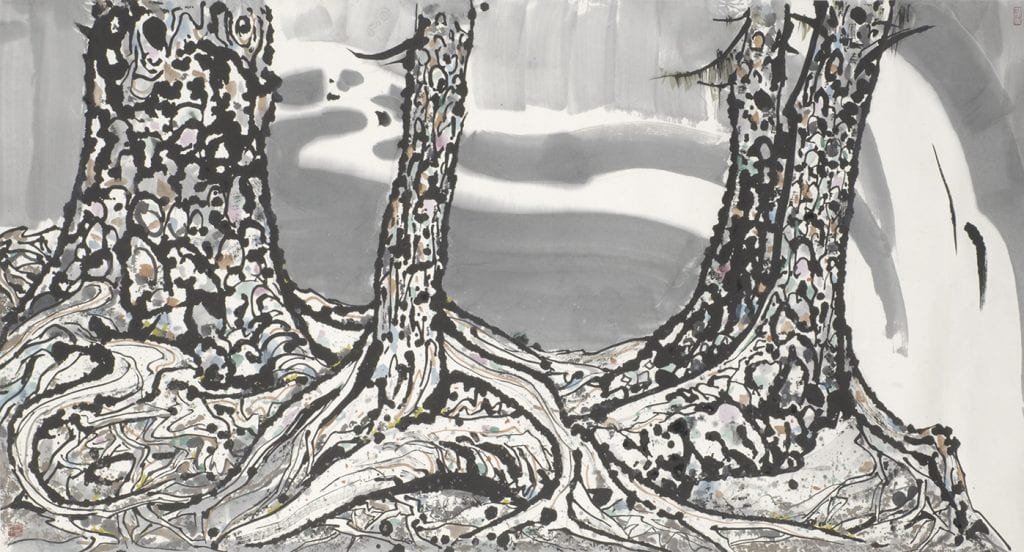Jennifer Dorothy Lee, PhD, Assistant Professor of East Asian Art, Department of Art History, Theory, and Criticism, School of the Art Institute of Chicago
“Ideology of the Image: Wu Guanzhong’s Abstract Expression in Early Post-Mao China”
Respondent: Orianna Cacchione, PhD, Curator of Global Contemporary Art, Smart Museum of Art
Friday, November 22, 2019
4:30-6:30 pm, CWAC 156
Abstract: Discrepant abstraction has become a fulcrum of comparative “global” art histories, and this presentation enters the fray. Outside of contemporary China, abstraction maintains intellectual baggage redolent of Meyer Schapiro’s line about paintings “made up of colors and shapes, representing nothing.” Continuing a discussion conducted in the first “Writing & Picturing in Post-1945 Asian Art” symposium hosted by the University of Chicago in 2017, my paper reintroduces the painter Wu Guanzhong (吴冠中, 1919-2010) through a new critical lens that emphasizes Wu’s controversial writings and institutional critique from the late 1970s. Through Wu, I argue that abstraction in twentieth century China carried connotations distinct from its resonances in the North Atlantic, which inform how the concept can be understood in globalizing cultural discourses today. More specifically, I address how Wu Guanzhong repurposed abstraction for critical discourse in China in the wake of the Cultural Revolution (1966-1976). In this historical moment, institutional and political elites in Beijing regarded painterly abstraction with great suspicion, owing to its associations with the bourgeois-capitalist art worlds of Paris and New York. I show how Wu Guanzhong performed an intriguing series of aesthetic interventions through his writings, utilizing Maoist logic to reposition abstraction as a politically neutralized concept. Once filtered through the language of radical materialism, abstraction ultimately took hold as a renewed term of engagement in the early post-Mao art world by the 1980s.
Wu Guanzhong, Roots, 1980. Chinese ink and colour on paper, 96 x 179.5 cm. Collection of National Gallery Singapore. Image courtesy of National Heritage Board.
This event is sponsored by the University of Chicago Center for East Asian Studies with support from a Title VI National Resource Center Grant from the United States Department of Education.
Persons with concerns regarding accessibility please contact Zhenru Zhou (zhenru@zhenruzhou.com) and Yin Wu (yinwu@uchicago.edu).
++++++++++++++++++++++++++++
Bio:
Jennifer Dorothy Lee is Assistant Professor of East Asian Art in the Department of Art History, Theory, and Criticism at the School of the Art Institute of Chicago. In Spring 2020 Lee will serve as Getty Visiting Lecturer in the Department of Art History at the University of Chicago. Lee’s research focus encompasses social history and comparative and transnational perspectives on China, critical area studies of Asia, as well as theories of socialism. Lee’s first book project, Anxiety Aesthetics: Maoist Legacies in China, 1978-1985, offers a sustained study of aesthetic theory, art, and subjectivity redefined in the fleeting historical moment bridging the Mao era with Dengist reforms.
Orianna Cacchione is Curator of Global Contemporary Art, at the Smart Museum of Art, University of Chicago. Her curatorial practice is committed to expanding the canon of contemporary art to respond to the global circulations of art and ideas.The recent exhibitions that Cacchione curated at the Smart Museum include Tang Chang: The Painting that Is Painted with Poetry Is Profoundly Beautiful, and Samson Young: Silver Moon or Golden Star, Which Will You Buy of Me? Prior to joining the Smart Museum, Cacchione was Curatorial Fellow for East Asian Contemporary Art in the Department of Modern and Contemporary Art at the Art Institute of Chicago.

very good and very useful article.
Klinik Aborsi Jakarta